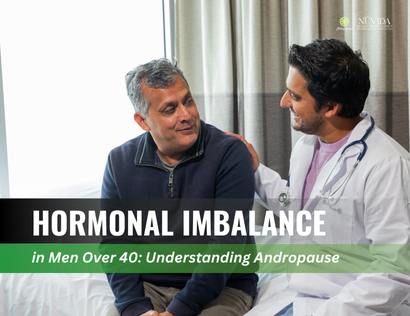
Hormonal Imbalance in Men Over 40: Understanding Male Hormonal Changes
Hormonal health is often thought of in the context of women, particularly during menopause, but men are also immune to significant hormonal shifts as they age. For men, the term often used to describe age-related hormonal imbalance is “male menopause” or andropause. While this term is not as widely recognized as menopause, it highlights the critical changes men experience after the age of 40 due to declining testosterone levels and other hormonal fluctuations. Understanding these changes and addressing their symptoms can significantly enhance quality of life.
What Is Andropause?
Andropause, often referred to as late-onset hypogonadism, describes a gradual decline in testosterone levels and other hormonal changes in men, typically occurring after the age of 40 years. Unlike the sudden hormonal drop women experience during menopause, andropause is a slower and more subtle process. Testosterone, the primary male reproductive hormone, plays a crucial role in muscle mass, bone density, mood, libido, and overall energy levels. The decline in testosterone levels is a natural part of aging. According to studies, testosterone levels drop about 1% per year after age 30 or 40 years. By the time men reach their 70s, testosterone levels could be 30-50% lower than their peak.
Causes of Hormonal Imbalance in Men Over 40
Several factors contribute to hormonal imbalance in men as they age. These include:
- Age-Related Decline in Testosterone: As men age, the body’s production of testosterone naturally decreases. This gradual decline can lead to noticeable changes in physical and mental health.
- Lifestyle Factors: Poor diet, lack of exercise, excessive alcohol consumption, smoking, and high stress levels can exacerbate hormonal imbalances.
- Chronic Conditions: Conditions like obesity, diabetes, hypertension, and metabolic syndrome are linked to reduced testosterone levels.
- Sleep Disorders: Insufficient or poor-quality sleep can lower testosterone levels and disrupt the balance of other hormones, including cortisol.
- Medications: Certain medications, particularly those for chronic diseases, can impact hormone levels.
Symptoms of Hormonal Imbalance in Men
Hormonal imbalances in men can manifest in a variety of ways. Some common symptoms include:
- Low Energy and Fatigue: A significant drop in energy levels can make it difficult to maintain productivity and motivation.
- Reduced Libido and Erectile Dysfunction: Testosterone is critical for maintaining sexual desire and performance. Lower levels can lead to a reduced interest in sex and difficulties with erections.
- Mood Changes: Hormonal shifts can lead to irritability, depression, or anxiety.
- Loss of Muscle Mass and Increased Body Fat: Testosterone supports muscle growth and fat distribution. Its decline can result in decreased muscle mass and an increase in abdominal fat.
- Sleep Disturbances: Hormonal imbalances may cause insomnia or other sleep disorders.
- Cognitive Decline: Memory issues, difficulty concentrating, and mental fog are often associated with low testosterone levels.
- Bone Density Reduction: Testosterone helps maintain bone density, so lower levels increase the risk of osteoporosis.
Diagnosing Hormonal Imbalance
If you’re experiencing symptoms of hormonal imbalance, it’s important to consult a healthcare provider. Diagnosis typically involves:
- Blood Tests: A blood test can measure testosterone levels, as well as other hormones like cortisol, thyroid hormones, and insulin.
- Medical History: Your doctor will review your medical history, lifestyle factors, and symptoms to determine the underlying causes.
- Physical Examination: A physical exam can identify any physiological signs of hormonal imbalance.
Managing Hormonal Imbalance in Men Over 40
Hormonal imbalances can often be managed with lifestyle changes, medical interventions, or a combination of both. Here are some approaches to consider:
1. Lifestyle Adjustments

- Exercise Regularly: Strength training and aerobic exercises can boost testosterone levels naturally.
- Eat a Balanced Diet: Incorporate foods rich in zinc, magnesium, healthy fats, and vitamins D and B to support hormonal health.
- Maintain a Healthy Weight: Excess body fat, particularly around the abdomen, is linked to lower testosterone levels.
- Sleep Well: Aim for 7-9 hours of quality sleep each night to support overall hormonal balance.
- Reduce Stress: Engage in stress-reducing activities like meditation, yoga, or hobbies.
2. Medical Treatments

- Testosterone Replacement Therapy (TRT): This treatment involves supplementing testosterone levels through injections, gels, patches, or pellets. While effective, TRT requires careful monitoring to avoid side effects.
- Medications for Symptoms: Medications may be prescribed to manage specific symptoms like erectile dysfunction or depression.
3. Natural Remedies and Supplements

- Herbal Supplements: Fenugreek, ashwagandha, and ginseng are believed to support testosterone production.
- Vitamins and Minerals: Ensure adequate intake of vitamin D, magnesium, and zinc, which are crucial for hormonal health.
The Importance of Monitoring and Professional Guidance
Managing hormonal imbalance is not a one-size-fits-all process. Every individual’s hormonal health is unique, requiring personalized approaches. Regular monitoring by healthcare professionals is essential to ensure that treatments are effective and safe. Hormonal imbalance in men over 40 is a natural part of aging, but it doesn’t have to diminish quality of life. By understanding the causes and symptoms of andropause and implementing lifestyle changes or seeking medical support, men can effectively manage these changes and maintain vitality, energy, and overall well-being.
If you’re experiencing symptoms of hormonal imbalance, don’t hesitate to consult a healthcare provider. Early diagnosis and proactive management can make all the difference in navigating this stage of life with confidence and strength.



Leave A Comment